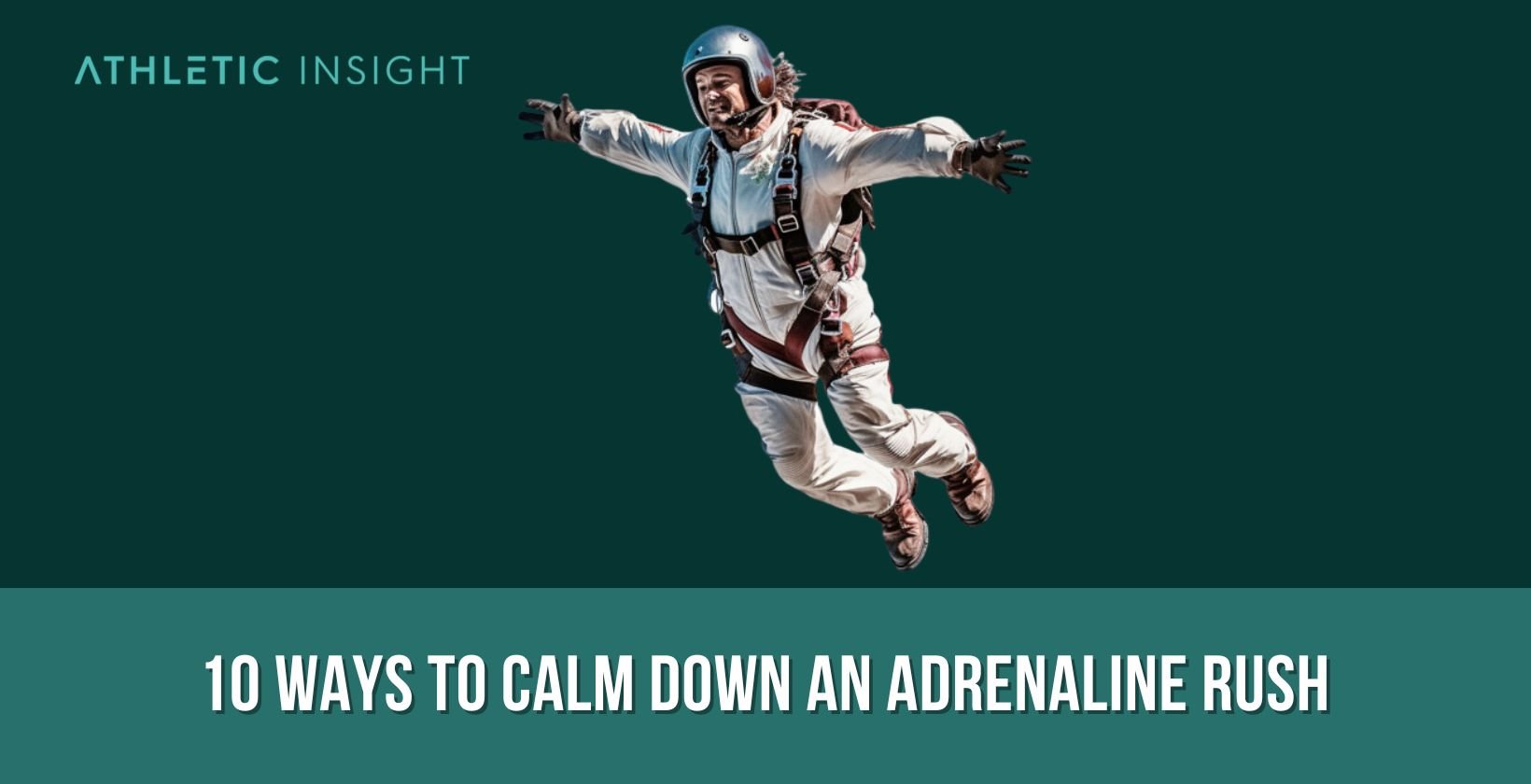An adrenaline rush can be an intense experience, often characterized by increased heart rate, rapid breathing, and heightened senses. While these surges of adrenaline can be beneficial in certain situations, such as during a fight-or-flight response, they may also cause anxiety or discomfort in everyday life. In this article, 10 strategies will be discussed that will help calm down an adrenaline rush and restore balance to your body and mind.
1. Breathe Deeply
Deep breathing is a simple yet effective technique that can help regulate the nervous system, reduce stress, and alleviate adrenaline surges. By consciously focusing on slow, controlled inhalations and exhalations, you can stimulate the parasympathetic nervous system, promoting relaxation and counteracting the effects of adrenaline. One example of deep breathing is the 4-7-8 technique, where you inhale for four seconds, hold your breath for seven seconds, and exhale for eight seconds.
2. Practice Mindfulness
Mindfulness is the practice of maintaining non-judgmental awareness of one’s thoughts, emotions, and physical sensations in the present moment. Engaging in mindfulness exercises, such as meditation, can help regulate adrenaline levels by promoting relaxation, reducing stress, and fostering a sense of inner calm. For example, try focusing on your breath or engaging in a body scan meditation to bring your attention to the present moment and reduce adrenaline-induced anxiety.
3. Have a Regular Exercise
Regular exercise can help alleviate adrenaline surges by releasing endorphins, which are natural mood-boosting chemicals, and promoting a sense of well-being. Exercise can also assist in reducing stress and improving overall mental health. Engaging in activities such as yoga, swimming, or jogging can contribute to balanced adrenaline levels and improved stress management. For example, try incorporating at least 30 minutes of moderate-intensity exercise into your daily routine to promote a sense of calm and relaxation.
4. Use Positive Self-Talk
Positive self-talk involves replacing negative thoughts with encouraging and supportive statements. This practice can help counteract the effects of an adrenaline rush by promoting relaxation, reducing anxiety, and fostering a sense of self-assurance. For example, remind yourself that the adrenaline surge is temporary and that you have the ability to regain control and manage your emotions effectively.
5. Listen to Calming Music
Calming music can help soothe the nervous system and reduce adrenaline levels by promoting relaxation and mental focus. Opt for genres such as classical, ambient, or nature sounds to create a serene atmosphere and alleviate the symptoms of an adrenaline rush. For example, consider creating a playlist of your favorite calming tracks to have readily available during periods of heightened stress or anxiety.
6. Take a Warm Bath or Shower
Immersing yourself in warm water can help relax your muscles, reduce stress, and alleviate the effects of an adrenaline rush. The warmth encourages blood flow and stimulates the release of endorphins, promoting a sense of relaxation and well-being. For example, try taking a 20-minute warm bath or shower to help calm your body and mind after a stressful event.
7. Use Aromatherapy
Aromatherapy involves the use of essential oils, derived from plants, to promote relaxation, reduce stress, and help manage adrenaline surges. Scents such as lavender, chamomile, and bergamot have been shown to have calming effects on the nervous system and may help to alleviate the symptoms of an adrenaline rush. For example, try diffusing essential oils in your living space or adding a few drops to a warm bath for a soothing, calming experience.
8. Get Enough Sleep
Obtaining adequate sleep is crucial for maintaining balanced hormone levels, including adrenaline. Sleep deprivation can exacerbate stress and anxiety, potentially leading to more frequent adrenaline rushes. Aim for 7 to 9 hours of quality sleep each night to ensure proper rest and recovery. For example, establish a consistent sleep schedule and create a relaxing bedtime routine to help promote restorative sleep and reduce adrenaline-induced anxiety.
9. Limit Caffeine Intake
Caffeine is a stimulant that can increase adrenaline levels and exacerbate anxiety. Reducing or eliminating caffeine intake can help to prevent adrenaline rushes and promote a more balanced nervous system. For example, try switching to decaffeinated beverages or opt for herbal teas and other caffeine-free alternatives to minimize the risk of triggering an adrenaline surge.
10. Maintain a Balanced Diet
A well-balanced diet can play a crucial role in regulating adrenaline levels and managing stress. Consuming nutrient-rich foods, such as fruits, vegetables, lean proteins, and whole grains, can help to support optimal brain function and hormone balance. For example, incorporate foods rich in magnesium, such as leafy greens and nuts, to promote relaxation and reduce adrenaline-induced stress.
What is Adrenaline Rush?
An adrenaline rush is a sudden surge of the hormone adrenaline, also known as epinephrine, in response to a perceived threat, stress, or excitement. This physiological response prepares the body for a fight-or-flight reaction by increasing heart rate, blood pressure, and oxygen supply to the muscles, allowing for quick and decisive action in challenging situations.

How does Adrenaline Rush work?
An adrenaline rush is triggered by the activation of the sympathetic nervous system in response to a stressful or dangerous situation. This activation results in the release of adrenaline from the adrenal glands, causing a cascade of physiological changes, such as increased heart rate, rapid breathing, and heightened alertness. These changes help to prepare the body for immediate action, enabling individuals to respond effectively to threats or challenges.
What causes Adrenaline Rush?
There are five main causes for an adrenaline rush, these include physical or perceived danger, intense physical exertion, extreme emotions, stress or anxiety, and stimulants.
- Physical danger or perceived threats
- Intense physical exertion
- Extreme emotions, such as fear, anger, or excitement
- Chronic stress or anxiety
- Stimulants, such as caffeine or certain medications
How long does Adrenaline Rush last?
An adrenaline rush typically lasts for a short period, ranging from a few minutes to several hours, depending on the individual and the specific circumstances. As the body processes and clears adrenaline from the bloodstream, the physiological effects begin to subside, and a sense of calm is gradually restored.

What role does Nutrition play in regulating Adrenaline levels in the body?
Nutrition plays a significant role in regulating adrenaline levels, as certain nutrients can help to support the adrenal glands and promote a balanced nervous system. Consuming a nutritional diet rich in vitamins, minerals, and antioxidants can help to counteract the effects of stress and reduce the frequency of adrenaline rushes.
Is too much Adrenaline Rush bad?
Yes, excessive adrenaline rushes can be detrimental to both physical and mental health. Chronic exposure to high adrenaline levels can lead to a range of issues, including the following.
- Increased heart rate and blood pressure, potentially increasing the risk of cardiovascular disease
- Impaired immune system function, making the body more susceptible to infections
- Heightened anxiety, stress, and irritability
- Insomnia and sleep disturbances
- Adrenal fatigue, resulting in decreased energy levels and impaired stress response
It is essential to manage stress and implement strategies to calm down adrenaline rushes to maintain overall health and well-being.



